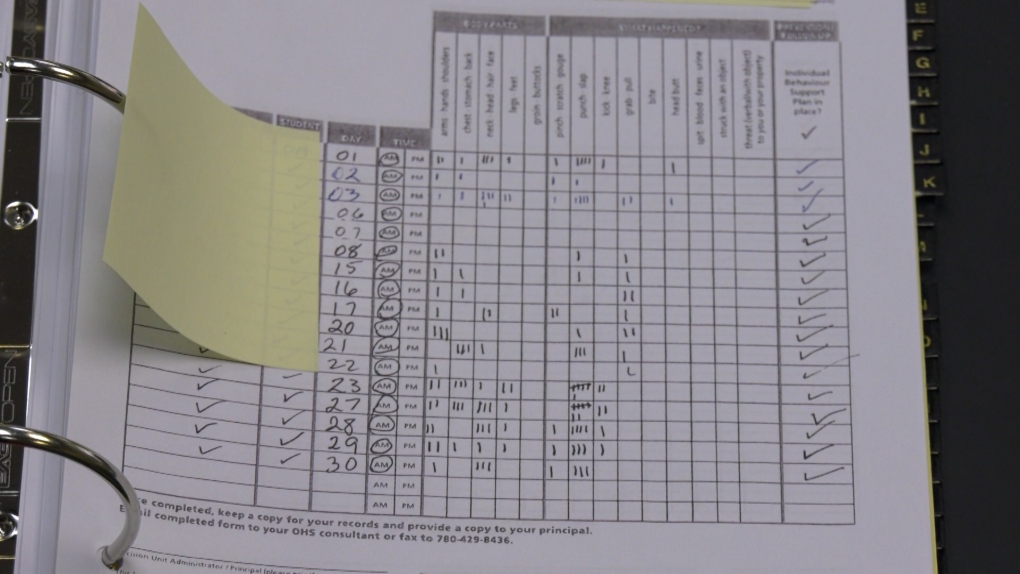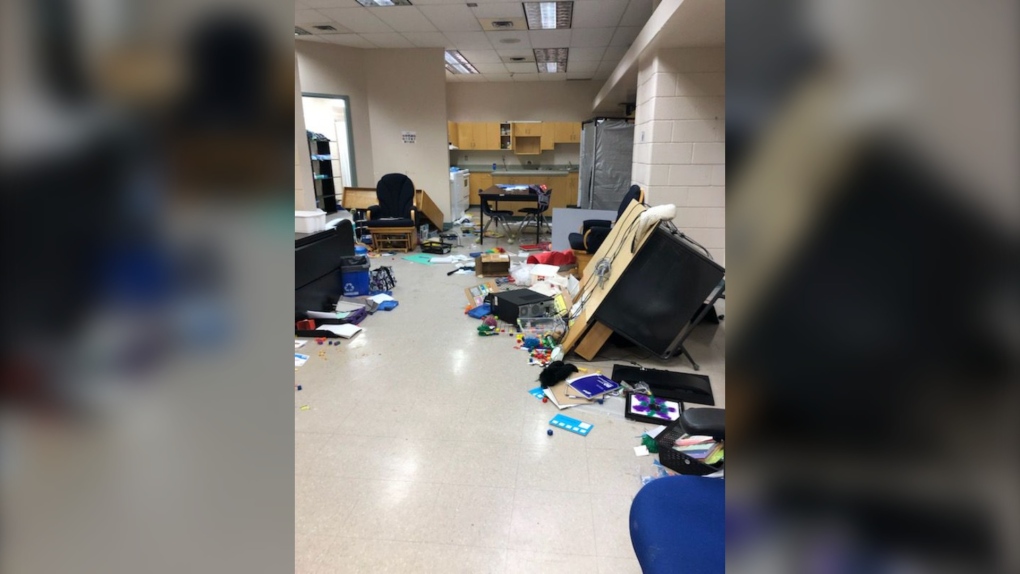Spit, punches and bites: School support staff detail rising violence from students
A former educational assistant is calling attention to the rising violence in Alberta’s classrooms.
Mandy Lamoureux is the president of Cupe 3550, a union representing around 3,000 educational support staff from the Edmonton Public School Board (EPSB).
At the most recent Cupe 3550 board meeting, Lamoureux donned the full personal protective equipment (PPE) she needed when she worked with students with complex needs.
“I would have to wear these arm guards to protect my skin from punctures when bit,” she said. “I would also put on some gloves to protect my hands from bodily fluids, and I would wear a surgical gown to protect my clothes, because he would sometimes smear bodily fluids onto me.
“And I would wear a face shield to protect my face from spit or punches, scratches or him trying to grab at my face.”
Lamoureux said the union gets calls daily from educational assistants (EAs) wanting better protection at work.
In 2023, the United Conservative Party created the classroom complexity grant, with $126 million over three years for public and private schools to support students with cognitive, social and emotional needs.
However, it’s up to school boards to determine how that money is spent, and Lamoureaux said not every school is willing or able to provide the needed gear.
“Each principal decides on what is purchased for their staff, and so some education assistants have asked for certain PPE and weren’t able to get access to it, citing budget cuts,” she added.
‘It takes a toll’
According to Lamoureux, Edmonton public schools have seen an “astronomical” increase in violence.
Where incidents against staff used to occur once or twice a week, Lamoureux says staff now deal with attacks almost daily.
Records show staff are being pinched, punched, kicked and head butted. Concussions are a serious concern, she said, and some staff are on long-term disability due to injuries from students.
“Not to mention just the physical injuries, the mental injury as well,” Lamoureux added. “It takes a toll on a person to be physically assaulted every day … Once it’s too many times and staff are talking about it happening all day long.”
 A log detailing acts of violence from students at an Edmonton school, showing almost daily incidents including punching and biting. (Nicole Lampa/CTV News Edmonton)The violence is also affecting teachers and other children.
A log detailing acts of violence from students at an Edmonton school, showing almost daily incidents including punching and biting. (Nicole Lampa/CTV News Edmonton)The violence is also affecting teachers and other children.
A recent survey by the Alberta Teachers’ Association (ATA) found that one in two teachers have encountered bullying or violence at school, and half of teachers felt uncomfortable with their ability to de-escalate such confrontations.
“I spent a couple hours with an educational assistant on the phone, because another student was choking another student, and she was worried that she wasn’t going to be able to release the grip, and then she could have had a death on her hands.
“And that’s a serious concern. And so she’s traumatized from that,” Lamoureux said.
In Quebec, where Lamoureux worked formerly, school boards employ specially trained education technicians who create individualized safety plans for students with complex needs.
There is no such program in Alberta, but Lamoureux is hoping to work with EPSB to bring something similar to local schools.
“When everyone is on the same page, and everyone understands why someone is having a behaviour, you’re better to implement strategies to help that student regulate, and to eliminate the behaviour,” she added.
In a statement, EPSB said engagement with Cupe 3550 and other groups was ongoing, but no other details were given.
“We continue to work together to take steps, explore and address concerns raised and support all staff in a safe working environment,” the statement read in part.
Early intervention
One mother, who is not being identified to protect her child’s identity, said her six-year-old son with autism can be aggressive.
Recently, he bit an EA and a school bus driver.
“I was called to the school and was told that he would have been suspended if he had been older,” she said. “And I don’t think that that was a suitable punishment, if you want to even call it that, for a child that’s six, nonverbal and autistic.”
While her son receives several types of therapy outside of school, she wants to see educators empowered with the right tools and training to help her child, who doesn’t understand that biting is wrong.
“It’s a safety issue, as well as it helps cope with everything that’s going on,” the mother said. “Some children, if they don’t have these things early on, it gets worse as they get older.”
“The older they get, the harder it is to break a habit,” Lamoureux said.
According to Lamoureux, the Program Unit Funding (PUF) grant used to support early education for children with developmental disabilities. However, funding was cut in 2020, removing eligibility for Kindergarden-aged kids.
“We’re now seeing the fallout from that,” she added. “A lot of our incidents that we’re hearing about from our schools are in Grade 2, 3, that’s where the program was cut a few years ago.”
Alberta Education Minister Demetrios Nicolaides said the 2024 budget includes $26 million over three years to support enrollment into the PUF program.
Alberta was the fastest growing province in Canada last year, and Nicolaides said that rate of growth has put pressure on schools.
“It is evident we are seeing the convergence of a multitude of stressors manifesting in the classroom and school environment: ballooning class sizes, complex needs without supports, massive influx of new students who are unfunded, and mounting mental health needs going unsupported,” Support Our Students Alberta said in a statement. A photograph showing a classroom after it was trashed by an aggressive student in 2022. (Photo: Mandy Lamoureux)
A photograph showing a classroom after it was trashed by an aggressive student in 2022. (Photo: Mandy Lamoureux)
Nicolaides said he’s aware of the “worrying trends” in aggression in school settings, and he’s spoken to the ATA concerning the recent report.
“They did note that many of their teachers, and again, I would imagine there’s some carryover with educational assistants, they didn’t feel that they had all of the necessary strengths, skills or training to de-escalate situations,” Nicolaides said. “There may be some requests for additional training, and there may be some help that we can provide in that regard.”
Lamoureaux said EPSB seems open to supplying PPE for EAs. She’s optimistic about that, but said more needs to be done soon to reduce the strain on schools and staff from the mounting injuries, trauma and burnout caused by the rising violence at school.
“it’s going to come to a point where someone’s going to be gravely injured,” she added. “So we’re really, really concerned about this.
“If there is no change now, it’s going to get so much worse, and we don’t want it to go to an extreme before it gets better.”
With files from CTV News Edmonton’s Nicole Lampa
View original article here Source









